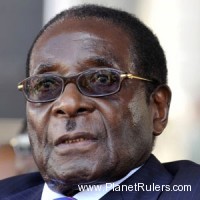Emmerson Mnangagwa, President of Zimbabwe (re-elected on Jul 30, 2018 with 50.6% of the vote)
 Emmerson Dambudzo Mnangagwa (born 15 September 1942) is a longtime ally of former President Robert Mugabe and a senior member of the ruling ZANU–PF party, Mnangagwa served as Vice President of Zimbabwe from 2014 until his dismissal in November 2017, shortly before the November coup d’état against Mugabe. On 21 November 2017, Mugabe resigned, with ZANU-PF chief whip telling news organisations that Mnangagwa would take over as president within 48 hours.
Emmerson Dambudzo Mnangagwa (born 15 September 1942) is a longtime ally of former President Robert Mugabe and a senior member of the ruling ZANU–PF party, Mnangagwa served as Vice President of Zimbabwe from 2014 until his dismissal in November 2017, shortly before the November coup d’état against Mugabe. On 21 November 2017, Mugabe resigned, with ZANU-PF chief whip telling news organisations that Mnangagwa would take over as president within 48 hours.
Mnangagwa was a leader during the Zimbabwean War of Liberation. After Zimbabwe was recognized in 1980, Mnangagwa held a series of senior cabinet positions under Mugabe, including as minister of state security during the Gukurahundi massacres in which thousands of Ndebele civilians were killed. Mnangagwa blamed the army for the massacres and continued to hold senior cabinet positions, though he is widely believed to be responsible.
After a demotion to Minister of Rural Housing in 2005, Mnangagwa restored his favour with Mugabe by playing a critical role in Mugabe retaining power by brokering a power sharing pact after the disputed general election in 2008. Mnangagwa served as Minister of Defence from 2009 to 2013, when he became Minister of Justice. Mnangagwa was also appointed Vice President in December 2014 and was widely considered to be a leading candidate to be Mugabe’s successor.
However, Mnangagwa was opposed by the Generation 40 faction led by President Mugabe’s wife, Grace Mugabe. After being dismissed from his position by President Mugabe in November 2017 for allegedly plotting against the government, he fled to South Africa. General Constantino Chiwenga, his ally and chief of the Zimbabwe Defence Forces, launched a coup d’état to end Mugabe’s purges of senior ZANU-PF officials. Mnangagwa was then considered the likely successor to Mugabe in any political resolution from the coup.
He is nicknamed “Garwe” which means “the crocodile” for the political resilience group he founded, and his faction in ZANU-PF is nicknamed Lacoste.
Source: https://en.wikipedia.org/wiki/Emmerson_Mnangagwa
Robert Gabriel Mugabe, Former President of Zimbabwe (resigned on Nov 21, 2017, bringing an end to 37 years of rule)
 First prime minister (1980– ) and president (1987– ) of Zimbabwe, born in Kutama, Zimbabwe (formerly Southern Rhodesia). Largely self-educated, he became a teacher in 1942. After short periods in the National Democratic Party and Zimbabwe African People’s Union (ZAPU), he was briefly detained, but escaped to co-found, with Ndabaningi Sithole, the Zimbabwe African National Union (ZANU). After a 10-year detention in Rhodesia (1964–74) he spent five years in Mozambique gathering support in preparation for Zimbabwe’s independence in 1980.
First prime minister (1980– ) and president (1987– ) of Zimbabwe, born in Kutama, Zimbabwe (formerly Southern Rhodesia). Largely self-educated, he became a teacher in 1942. After short periods in the National Democratic Party and Zimbabwe African People’s Union (ZAPU), he was briefly detained, but escaped to co-found, with Ndabaningi Sithole, the Zimbabwe African National Union (ZANU). After a 10-year detention in Rhodesia (1964–74) he spent five years in Mozambique gathering support in preparation for Zimbabwe’s independence in 1980.
His ZANU and the ZAPU forces of Joshua Nkomo united in 1976 to form the Patriotic Front, and later, a coalition government. Though Mugabe formerly espoused a pragmatic Marxism and declared his intention of turning Zimbabwe into a one-party state, multi-party elections were held in 1990 (which he won), and his party dropped all references to ‘Marxism–Leninism’, and ‘scientific socialism’ from its constitution in 1991.
He came to world attention in 2000 for initiating a land redistribution policy aimed at local white farmers, which resulted in intimidation, civil disturbance, some deaths, and much international condemnation. He won a fifth term in office in 2002, but controversy surrounding the election process led to Zimbabwe being suspended from the Commonwealth for a year, and following the decision to reaffirm the suspension in 2003 he announced that he would withdraw from the organization.

